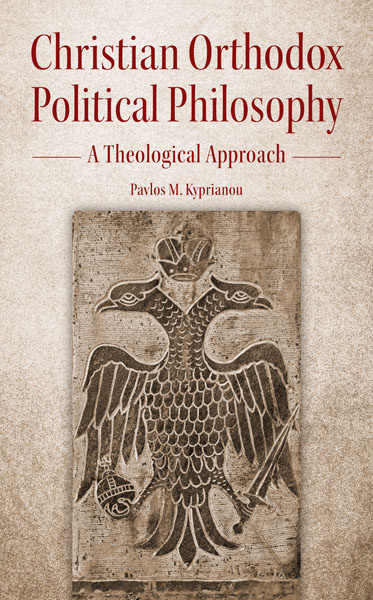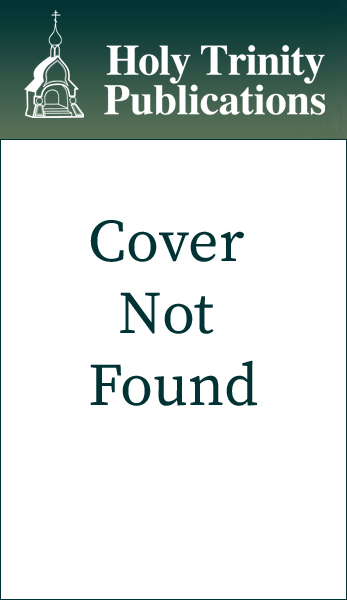Christian Orthodox Political Philosophy
A Theological Approach
- AvailablePaperback9781942699491168 pages: USD 24.95 / GBP 20.95 Add to basket
- AvailableDigital9781942699538168 pages: USD 14.99 / GBP 11.99
— About the Book —
The Church is commonly spoken of as an institutional reality, and is much less frequently recognized as a spiritual and heavenly reality called by God “to make disciples of all nations” (Matt 28:19).
This structured and integrated work presents a Christian Orthodox political thought in which the Church is neither sidelined as having no relevance to this present life, nor dominated by temporal questions or popular movements at the expense of its eternal salvific mission.
The author grounds the mission of the Church in the present world both on an understanding of God as Trinity and in her mission to baptize diverse cultures. To do this effectively the Church must recognize and adapt to local and contemporary political and social trends and patterns. It must exemplify the Gospel as a way of communal and social life, not allowing itself to be reduced to an impersonal ideology manifest within the sphere of imagination, ideology, or a private individualistic existence.
Drawing upon this philosophy, the author proposes a way for the Church to understand questions of both domestic politics and international relations with a view to bringing the world into the Kingdom of God. He suggests specific steps that could be taken to heal and strengthen inter-Orthodox relations, addressing in particular the canonical challenges of the Orthodox diaspora and tensions between the Greek and Slavic components of the Church. Though these specific proposals will by no means enjoy universal acceptance, they will serve as a springboard for further dialogue as the Orthodox world seeks to apply these principles in all nations, no matter their current political circumstances.
— Author Biography —
Pavlos Kyprianou is a graduate of King's College London and a Barrister-at-Law since 2000. Until 2013, he specialized in criminal, administrative, and civil law at the law Office of Michael Kyprianou & Co., becoming a partner there in 2008 to 2013. He is the author of H Metarrythmise kai anadomese tes Kypriakes Dikaiosynes (in Greek, trans: The Reform and Restructuring of Cypriot Justice) Epifaniou Publications, Nicosia 2014.
Since 2016 he has been a member of the monastic brotherhood of the Holy Metropolis of Limassol, receiving the name Leontios at his monastic tonsure.
— Contents —
Foreword
Preface
INTRODUCTION
—The inspiration behind this book
—Aims of the Book
—Outline of the Book
- CHURCH AND WORLD
—Brief History of the Church
—The Church is the pre-fall world
—The fallen world is the same as the pre-fall world only now under demonic influence
—The relationship between the Church and the world after the fall
—Churchly sanctification of the world v worldly secularization of the Church
- CHURCH AND NATION
—The nation as a post-fall phenomenon
—Nationalism as a post-fall ideology
—Ideology as division and heresy
—Sanctification and self-transcendence of the nation
—The Mission of the Jewish Nation to the World
—How Christ viewed his own nation
—The fall out of Christ with the national establishment
—How the Apostle Paul viewed his own nation
—The national self-transcendence of the Greek nation for the sake of a Christian World
—Christian Orthodoxy vis-a-vis national power, resistance and liberation
—Conclusion: cohabitation, adoption and ecumenization of the nation by the Church within the Church, and through the Church
- CHURCH AND STATE
—The state as a post-fall phenomenon
—The recognition of the role of the state by the Church
— Relationship of the Church with political power
—A person-centered system of government – Monarchy
—The relationship of the Church with ideologies and parties
—Church and human rights
—Church and Person-centered Economic Policy
—A Person-centered Legislative System
—A Person-centered Judicial System
- RELATIONSHIP BETWEEN LOCAL CHURCH, STATE, NATION AND UNIVERSAL WORLD
—Priority of local state-national consciousness over ‘supra-state’ national consciousness
—Coexistence of Local and Universal (Ecumenical) Awareness
—Church and national symbols
—Preference and support of the Church for the creation and/or strengthening of multinational Orthodox-majority states
— ‘Covariation’ with a constructive and not negating effect
— Conclusion
- THE ORTHODOX DIASPORA
—Definition
—Diaspora and ecclesiastical disorder
—The principle of ‘covariation’ and the Orthodox Diaspora
- 6. ORTHODOXY AND INTER-ORTHODOX, INTERNATIONAL RELATIONS
—The Geopolitical division between Orthodox states
—Russia ‘Protector of Orthodox Peoples’
—The granting of autocephaly to a local Church
—Transcending the diarchy between the Greek and Russian world
- CONCLUSIONS - PROPOSALS
—World unity in Christ
—Adaptation of the Church to political and state conditions in order to reinforce its spiritual work and influence
—The institutionalized protection and implementation of human rights within a person-centered and commune-centered context
—The Church should encourage the combined implementation of ideologies to strengthen the state and serve society
—The Church - institutionalized and official Advisor to the state but without institutionalized power
—The Church should encourage citizens, politicians and political parties to resist and refrain from identifying with ideologies
—The Church in support of the institution of Monarchy within a democratic framework. 110
—The Church in support of a centrist, person-centered economic policy
—Establishment of advisory bodies with eligibility for membership to those who contribute to the state treasury over and above their tax obligations
—The creative ‘covariation’ of the Church with state administrations
—The creation of multinational states or commonwealths, and the creation of a common national awareness based on Orthodox civilization
—The Orthodox Diaspora should become a field of healthy missionary competition and transcendence of nationalism
—Official recognition of the Russian Federation as the Geopolitical Protector of Orthodoxy
Bibliography
Appendix: The war in Ukraine
Notes
Bibliography
Index





